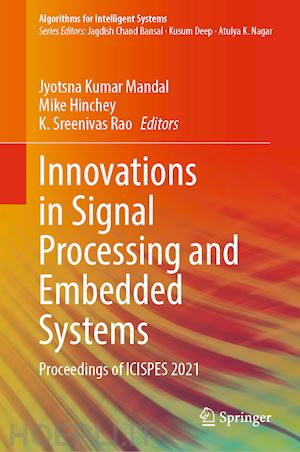
Questo prodotto usufruisce delle SPEDIZIONI GRATIS
selezionando l'opzione Corriere Veloce in fase di ordine.
Pagabile anche con Carta della cultura giovani e del merito, 18App Bonus Cultura e Carta del Docente
This book covers four sections such as artificial intelligence and machine learning; VLSI and signal processing; robotics and automation; and communications and networking. This book is a collection of selected papers presented at the First International Conference on Innovations in Signal Processing and Embedded Systems (ICISPES 2021), organized by MLR Institute of Technology, Hyderabad, India, during October 22–23, 2021. The topics covered are advanced communication technologies, IoT-based systems and applications, application AI in computer vision, natural language processing, reinforcement learning, ANN and deep neural networks, RNN, GAN, CNN and RBM, SOC, NOC design, VLSI and CAD/CAM, cross-layer design, fault tolerance and computation theories, FPGA in outer space, nanotechnology, semiconductor technology, signal and image processing, high-performance computing, pattern recognition and computer vision innovations in robotics, reconfigurable robots, and MEMS/NEMS.
Jyotsna Kumar Mandal did M. Tech. in Computer Science from University of Calcutta in 1987 and was awarded Ph. D. (Engineering) in Computer Science and Engineering by Jadavpur University in 2000. He is working as Professor of Computer Science & Engineering, former Dean, and Faculty of Engineering, Technology & Management, KU, for two consecutive terms during 2008–2012. He is Director, IQAC, Kalyani University, and Chairman, CIRM, and Placement Cell, served as Professor Computer Applications, KGEC, as Associate Professor Computer Science, Assistant Professor Computer Science North Bengal University for fifteen years, and as Lecturer at NERIST, Itanagar, for one year. He has 34 years of teaching and research experience in coding theory, data and network security and authentication; remote sensing and GIS-based applications, data compression, error correction, visual cryptography, and steganography. He was awarded 24 Ph.D. degrees, one submitted, and 8 are pursuing. He supervised 03 M. Phil, more than 80 M. Tech, and more than 150 M.C.A Dissertations. He is Guest Editor of MST Journal (SCI indexed) of Springer, published more than 450 research articles out of which 190 articles in international Journals, published 15 books from LAP Germany, IGI Global, Springer, etc., organized more than 50 international conferences and corresponding editors of edited volumes and conference publications of Springer, IEEE, and Elsevier, etc., and edited more than 50 volumes as Volume Editor. He received “Siksha Ratna” Award from Higher Education, Government of West Bengal, India, in the year 2018 for outstanding teaching activities, Vidyasagar Award from International Society for Science Technology and management in the fifth International Conference on Computing, Communication and Sensor Network, Chapter Patron Award, CSI Kolkata Chapter on 2014, “Bharat Jyoti Award” for meritorious services, outstanding performances, and remarkable role in the field of Computer Science & Engineering on August 29, 2012, from International Friendship Society (IIFS), New Delhi, A. M. Bose Memorial Silver medal, and Kali Prasanna Dasgupta Memorial Silver medal from Jadavpur University.
Professor Mike Hinchey is President of IFIP, the International Federation for Information Processing, founded by UNESCO in 1960, is Emeritus Director of Lero-the Science Foundation Ireland Centre for Software, and Professor of Software Engineering at University of Limerick, Ireland. Prior to joining Lero, Professor Hinchey was Director of the NASA Software Engineering Laboratory. The holder of 30 US patents, in 2009 he was awarded NASA’s Kerley Award as Innovator of the Year and is recognized in the NASA Inventors Hall of Fame. Professor Hinchey holds a B.Sc. in Computer Systems from University of Limerick, M.Sc. in Computation from University of Oxford, and Ph.D. in Computer Science from University of Cambridge. Professor Hinchey is Chartered Engineer, Chartered Engineering Professional, Chartered Mathematician, and Charted Information Technology Professional, as well as Fellow of the IET, British Computer Society, Engineers Australia, Engineers Ireland, and Irish Computer Society, of which he is also President. In 2018, he became Honorary Fellow of the Computer Society of India and was SEARCC Global ICT Professional of the Year 2018. He was Chair of IEEE UK & Ireland Section for 2018-2019. He is Author/Editor of more than 20 books and over 200 papers on various aspects of computing, software engineering, and autonomous systems. He is Editor-in-Chief of Innovations in Systems and Software Engineering: a NASA Journal (Springer) and Journal of the Brazilian Computer Society (Springer).
Dr. Koppula Srinivas Rao is currently working as Professor in the department of CSE, and Principal, MLR Institute of Technology, Hyderabad, Telangana, India. He obtained his Ph.D. in Computer Science and Engineering from Anna University, Chennai, and his master’s in computer science and engineering from Osmania University, Hyderabad. He has more than 27 years of teaching and research experience. His research interest includes artificial intelligence, machine learning, data mining, natural language processing, RFID data streams, and their applications to engineering. He has more than 27 publications to his credit in various reputed international journals and conference proceedings. He has delivered invited lectures and acted as Program Chair of many international conferences. He has edited one volume from Springer AISC in past, and he is also Editorial Board Member for AICC-2018 conference (Artificial Intelligence and Cognitive computing). He is Senior Member of IEEE and Life Member of Computer Society of India.











Il sito utilizza cookie ed altri strumenti di tracciamento che raccolgono informazioni dal dispositivo dell’utente. Oltre ai cookie tecnici ed analitici aggregati, strettamente necessari per il funzionamento di questo sito web, previo consenso dell’utente possono essere installati cookie di profilazione e marketing e cookie dei social media. Cliccando su “Accetto tutti i cookie” saranno attivate tutte le categorie di cookie. Per accettare solo deterninate categorie di cookie, cliccare invece su “Impostazioni cookie”. Chiudendo il banner o continuando a navigare saranno installati solo cookie tecnici. Per maggiori dettagli, consultare la Cookie Policy.